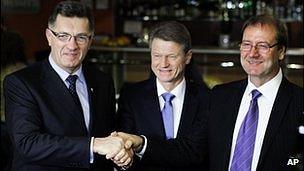Lithuania election: President moves to block coalition
- Published

Lithuania's president has threatened to block the new coalition being formed by three parties after a general election.
President Dalia Grybauskaite said she could not accept a government that included the Labour party, which came third in Sunday's poll but faces allegations of vote buying.
Labour was in advanced coalition talks with the first-placed Social Democrats, and the smaller Order and Justice.
The ruling conservatives looked certain to be ousted until the president spoke.
The president is normally expected to abide by the decisions of parliament, and an implicit threat to veto a coalition is unprecedented since Lithuania gained independence two decades ago, correspondents say.
"A party which is suspected of gross violations in the election, which is suspected of false accounting and non-transparent activities cannot participate in the government's formation," Ms Grybauskaite told a news conference.
She said police were investigating 18 counts of vote buying, with the Labour party allegedly involved in most of them.
After the two-round election, which was completed on Sunday, Labour won 29 seats, up from 10 last time.
The Labour leader, Viktor Uspaskich is also on trial for alleged tax fraud by his party, which he denies.
"The principle of the presumption of innocence must be kept to. The will of the people must not be spat upon," he said.
Deep recession
Mr Uspaskich had already reached agreement with the Social Democrats, which won the election with 40 seats and whose leader Algirdas Butkevicius was expected to become prime minister.
Mr Butkevicius said he was not now sure whether the Labour party would be part of his government or not.
Ms Grybauskaite said she would probably still name Mr Butkevicius as prime minister.
That opened the possibility that the conservative Homeland Union party, which came second with 32 seats, would be able to stay in government.
A coalition would need 71 seats for a majority in the 141-seat parliament.
Homeland Union had been thought to be on the way out, after introducing a drastic austerity programme which staved off national bankruptcy but saw economic output drop by 15%.
The opposition parties have promised to ease austerity and delay Lithuania's adoption of the euro.
- Published22 August 2023